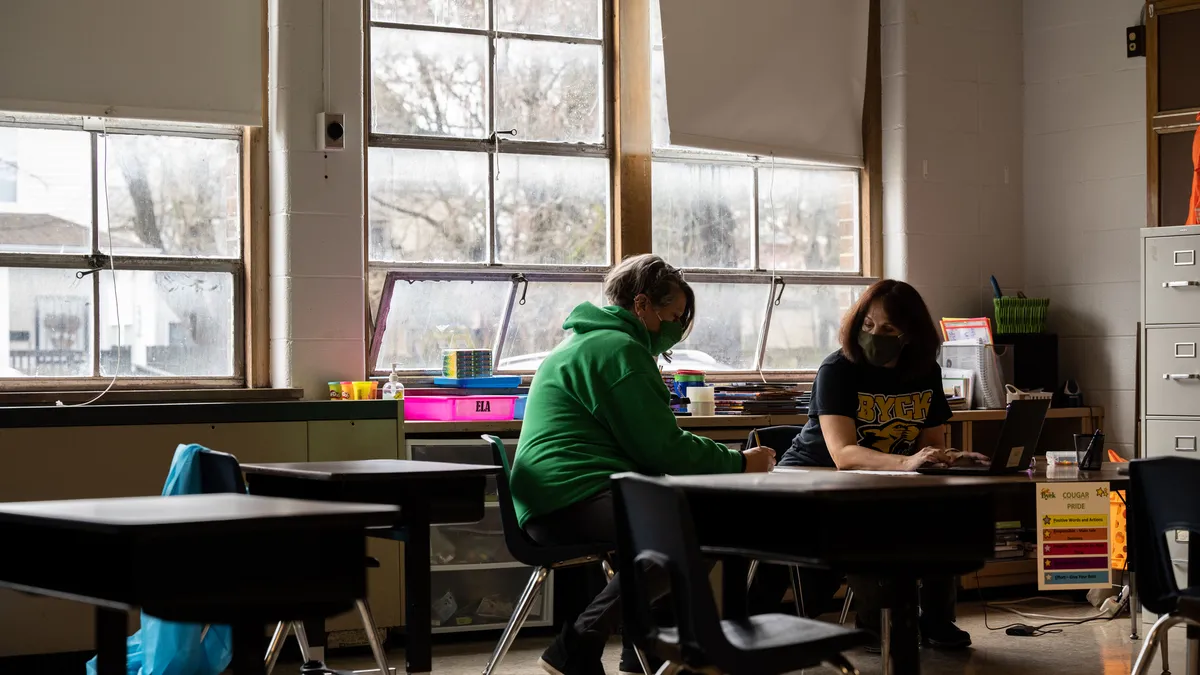Dive Brief:
- Among 2,000 teachers surveyed nationwide, 37% said they are more likely to leave the profession at the end of this school year if a push for laws that “prevent honest teaching and conversations” reaches their classrooms, according to data from Stand for Children, a nonprofit advocating for equity in public education, and SurveyUSA, an independent research firm.
- The Stand for Children survey further solidified previous data suggesting teachers are increasingly considering leaving the profession. Overall, nearly 3 in 10 teachers, or 29%, said they were likely or very likely to quit teaching at the end of this school year, according to Stand for Children.
- On top of that, 93% of surveyed teachers agreed it’s important for children to “learn to value and respect the humanity of every person and to recognize and reject racism,” Stand for Children found.
Dive Insight:
The Stand for Children survey highlights how laws seeking to ban issues of race, gender or other divisive topics in the classroom are only adding to the list of reasons teachers may want to leave the profession, said Colin Sharkey, executive director of the Association of American Educators, a national non-union professional educator organization.
Educators are currently facing a worsening substitute shortage making it difficult to take needed time off amid the latest surge of COVID-19 cases due to the omicron variant. In May, K-12 employees faced higher rates of burnout compared to other government employees, according to a MissionSquare Research Institute survey.
Legislation seeking “educational gag orders” is still gaining traction in various states, according to PEN America, a nonprofit advocating for freedom of expression that tracks bills limiting discussions on gender, race or divisive topics in K-12 schools.
“It’s just one more thing that would encourage an educator to find a different career,” Sharkey said.
The bills largely stems from conservative fears that critical race theory is being taught in the classroom, though it’s actually not taught in K-12 schools, according to a new study by researchers at the University of California, Los Angeles and the University of California, San Diego. In fact, CRT is a university-level theory tied to legal studies and education research, the study said.
A network of conservative organizations has encouraged local anti-CRT actions that have impacted 894 school districts representing 35% of all K-12 students, according to the UCLA-UCSD study.
Instead of proposing and passing laws that limit what teachers can discuss in a classroom, politicians should be looking for ways to help support teachers and prevent more from leaving by focusing on increasing their pay, said Jonah Edelman, executive officer of Stand for Children.
In 2021, discussion of teacher pay gained traction in state legislatures where many bills sought to improve educator salaries.
“What should be happening is politicians should be talking about how to address the existing shortage of teachers by paying teachers more and respecting them as professionals and supporting them in their craft,” Edelman said. “It’s clear there’s already a really concerning risk of a teacher exodus, which politicians are making demonstrably worse with these attacks.”














